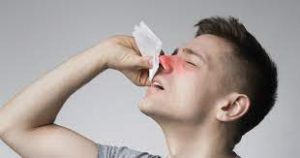This post is also available in:
Tiếng Việt (Vietnamese)

Definition
What are nasal polyps?
Nasal polyps are soft, painless, noncancerous growths on the lining of the nasal passages or sinuses. These are caused by chronic inflammation due to asthma, recurring infection, allergies, drug sensitivity or certain immune disorders.
Small nasal polyps may not cause symptoms. However, larger growths or groups of nasal polyps may cause breathing problems, a lost sense of smell, and frequent infections.
How common are nasal polyps?
Nasal polyps are extremely common. It commonly affects more females than males. It can affect patients at any age, most common in young and middle-aged adults. It can be managed by reducing your risk factors. Please discuss with your doctor for further information.
Symptoms
What are the symptoms of nasal polyps?
The common symptoms of nasal polyps are:
- A runny nose;
- Persistent stuffiness;
- Postnasal drip;
- Decreased or absent sense of smell;
- Loss of sense of taste;
- Facial pain or headache;
- Pain in your upper teeth;
- A sense of pressure over your forehead and face;
- Snoring;
- Itching around your eyes.
There may be some symptoms not listed above. If you have any concerns about a symptom, please consult your doctor.
When should I see my doctor?
You should contact your doctor if you have any of the following:
- Serious trouble breathing;
- Sudden worsening of your symptoms;
- Vision problem, such as double vision, reduced vision or limited ability to move your eyes;
- Severe swelling around your eyes;
- Increasingly severe headache accompanied by high fever or inability to tip your head forward.
If you have any signs or symptoms listed above or have any questions, please consult with your doctor. Everyone’s body acts differently. It is always best to discuss with your doctor what is best for your situation.
Causes
What causes nasal polyps?
The reason that causes nasal polyps is not clearly understand.
Risk factors
What increases my risk for nasal polyps?
There are many risk factors for nasal polyps, such as:
- Having asthma;
- Having aspirin sensitivity;
- Having allergic fungal sinusitis;
- Having cystic fibrosis;
- Having Churg-Strauss syndrome.
Diagnosis & treatment
The information provided is not a substitute for any medical advice. ALWAYS consult with your doctor for more information.
How are nasal polyps diagnosed?
Nasal polyps can be diagnosed through:
- Answers to questions about symptoms, a general physical exam, and an examination of the nose;
- Nasal endoscopy;
- Imaging studies;
- Allergy tests;
- Test for cystic fibrosis.
How are nasal polyps treated?
The first treatment goal for nasal polyps is to reduce their size or eliminate them. To get this goal, medications are usually the first approach. Drug treatments may include:
- Nasal corticosteroids: to reduce inflammation, including fluticasone (Flonase, Veramyst), budesonide (Rhinocort), flunisolide, mometasone (Nasonex), triamcinolone (Nasacort AQ), beclomethasone (Qnasl, Beconase AQ), and ciclesonide (Omnaris, Zetonna).
- Oral and injectable corticosteroids. In case that topical nasal corticosteroids are not useful or in case that nasal polyps are severe.
- Other medications: to treat conditions which contribute to chronic inflammation in your sinuses or nasal passages, including antihistamines to treat allergies and antibiotics to treat a chronic or recurring infection.
Surgery may sometimes be needed when medications cannot help. However, polyps sometimes tend to recur.
Read more: Upper respiratory tract infections
Lifestyle changes & home remedies
What are some lifestyle changes or home remedies that can help me manage nasal polyps?
The following lifestyles and home remedies might help you cope with nasal polyps:
- Manage allergies and asthma.
- Avoid nasal irritants, avoid breathing airborne substances such as allergens, tobacco smoke, chemical fumes, and dust and fine debris.
- Practice good hygiene, such as wash your hands regularly and thoroughly to protect against bacterial and viral infections that can cause inflammation of the nasal passages and sinuses.
- Humidify your home to moisten your breathing passages, improve the flow of mucus from your sinuses, and help prevent blockage and inflammation.
- Use a nasal rinse or nasal lavage to rinse your nasal passages to improve mucus flow and remove allergens and other irritants.
If you have any questions, please consult with your doctor to better understand the best solution for you.
Sources:

